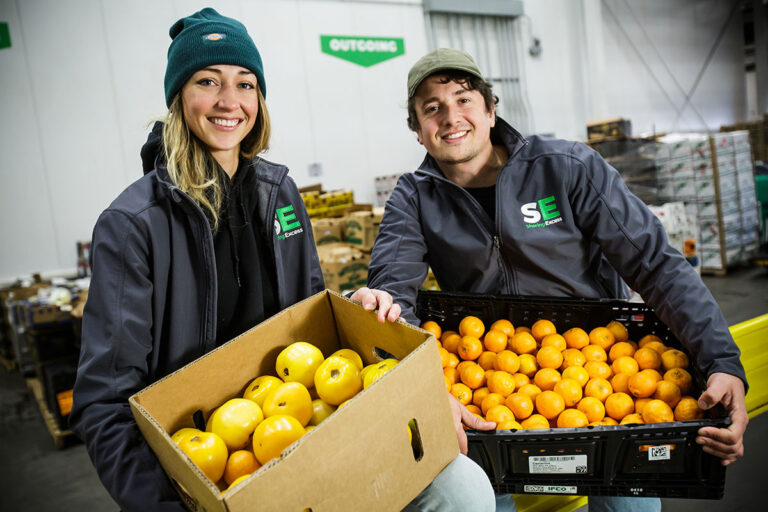Evan Ehlers
BA entrepreneurship and innovation ’19
Age 27
Victoria Wilson
BS entertainment and arts management ’19
Age 26
Co-Founders, Sharing Excess
Sharing Excess, a nonprofit that Evan Ehlers and Victoria Wilson launched in 2018 to fight hunger in Philadelphia by diverting food from landfills, is helping more communities than ever.
In the five years since Evan Ehlers launched Sharing Excess to bring surplus food to communities in need, the organization has rescued more than 15 million pounds of food. With an infusion of funds from a YouTube star and plans to expand to new cities, that’s just the beginning.
Ehlers and late-stage co-founder Victoria Wilson have begun working closely with a North Carolina-based philanthropy created by MrBeast, a YouTube persona created by entrepreneur Jimmy Donaldson, who has launched brands and charities. Sharing Excess sources food and sends truckloads to a MrBeast food bank. They hope to make food more available to every American, and, with MrBeast’s help, they’re ready to replicate their local success in locations across the East Coast. Ehlers and Wilson want to rescue more food and bring more communities together.
“I saw how much food was going to waste and it really struck a chord with me,” Wilson says. “It completely opened my eyes to something I could really put all of my energy and time into and would feel fulfilled in doing.”
“It’s created a beautiful network of people who care about one another,” Wilson says of Sharing Excess. “If we can do that here, it’s replicable in any other city worldwide.”
The pandemic era, a time of food insecurity and economic uncertainty for so many Philadelphians, has fueled expansion for the food-focused nonprofit. It has quickly grown to 30 employees, including Wilson, who joined as the organization’s operations director in March 2020 after jumping in a van with Ehlers, her former Drexel classmate, to rescue 20,000 pounds of food in 48 hours.
“I saw how much food was going to waste and it really struck a chord with me,” Wilson says. “It completely opened my eyes to something I could really put all of my energy and time into and would feel fulfilled in doing.”
Together, Wilson and Ehlers have built relationships across the city that allow them to rescue food bound for the trash — produce, dairy, meat, and even bakery and frozen items — and deliver it to distribution sites like food pantries, soup kitchens and community refrigerators, with help from a legion of volunteers. Much of the food they rescue comes from the Philadelphia Wholesale Produce Market, a 700,000-square-foot warehouse that is the largest of its kind in the world. Sharing Excess is embedded within the market, waiting to save anything that can’t be sold.
When an avocado surplus hit in October 2022, Sharing Excess was there to help navigate what it called “Avogeddon,” hosting a three-day giveaway in South Philadelphia’s FDR Park.
“We’re doing the logistical work to get that excess to people who need it before it goes to waste,” Ehlers says. “There’s more than enough out there; it’s just a matter of getting it to everyone.”
Sharing Excess may be in the early stages of expanding beyond Philadelphia, but hunger and excess know no boundaries — and neither do Ehlers and Wilson. They see potential for Sharing Excess to become a practice, a principle, a second-nature step for everyone around the world to take together.
“I want it to just dissolve itself into the common practice of humanity and communities everywhere,” Ehlers says.
If the rescue mission worked globally the way it does locally, that would mean billions of meals redistributed every year, Ehlers says. As Sharing Excess begins to enter new cities, its founders are ready to take it as far as it will go.
“This is the happiest that I could ever imagine myself,” Ehlers says. “I’m doing something that I find to be fulfilling, that is meaningful, and that I feel right dedicating my life to.”
The changes we’d like to see most in the world…
I’d like to see a world in which we waste less and share more. Everywhere, vital resources are being wasted or underutilized while billions of people suffer from the lack of those very same resources. There’s enough food to provide for everyone — it’s mainly a matter of improving logistics and social systems. With the right mix of love, hard work, technology, partnerships, and transformative ideas, we can provide everyone with the basic resources they need to live happy and healthy lives. Once all of humanity is no longer living just to survive, our potential as a species becomes limitless.
— Evan Ehlers
I want to live in a world where everyone has access and basic human rights to the things they need to survive, like clothing, shelter, and food. A world where asking for help or needing additional support is not stigmatized and is not hard to come by. A world where people acknowledge when they have more privileges or opportunities than others and use that power to create more equitable communities. That’s a world I’d like to see.
— Victoria Wilson



